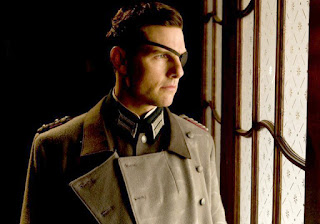Directed by Bryan Singer; produced by Gilbert Adler, Christopher
McQuarrie and Bryan Singer
In 1944, a group of well-placed German civilians and army officers
plan to assassinate their country’s leader, Adolf Hitler. Led by Generals von
Tresckow (Kenneth Branagh) and Olbricht (Bill Nighy), the group recruits
dissident Colonel Claus von Stauffenberg (Tom Cruise), who will carry out the
actual attempt. Hoping to end the world war and save countless lives, as well
as their country, the small group of men gamble everything to rid the Earth of
a tyrant.
A well-directed, acted and produced film, Valkyrie provides excitement and tension, as well as telling a
compelling story in a compelling manner. The script treats the audience
intelligently. There is a wealth of names and detail, but the movie is
confident that the viewers will be able to digest it all. As an example, one
scene has the conspiracy’s explosives expert, Colonel Mertz von Quirnheim
(Christian Merkel), explain that the windowless reinforced bunker in which the
assassination will occur negates the need for a large bomb, as the air pressure
in the virtually sealed building would magnify the blast. On the day of the
attempt, however, the vital briefing is moved to a ‘conference hut’.
Stauffenberg walks to it, staring at its tall, open windows. It is assumed the
audience understands the implication.
For all that, the script nonetheless is explicit where it needs to
be. The plan to kill Hitler was both simple (as many of the best plans are) but
ingenious. Walkürie
was the Nazis’ contingency operation to use the Berlin-based Reserve Army to
suppress riot and rebellion if the German people rose up against them. The
conspirators intended to use Walkürie for their own purpose: killing Hitler and blaming the act on a
combined SS/Gestapo coup d’état; the conspirators would implement Walkürie, use it to eliminate the entire
Nazi leadership and take control of the government. This scheme is elaborated
concisely and clearly by the characters. But one still must pay attention.
The direction is necessarily taut. A study of such an event would
provide enough material for an hours-long documentary, but for a thriller -
which is what Valkyrie is -
extraneous material needs to be jettisoned. This must be balanced with the
requirements of exposition, as noted above. The director, Singer, and editor,
John Ottman - who also composed the film’s music - are successful in this. The
running time is an unexpectedly brief 121 minutes, but there are no slow
moments.
The acting is very good. Cruise, as Stauffenberg, is probably the
least of the cast, though this is composed of excellent veterans such as Nighy,
Branagh, Tom Wilkinson, Terence Stamp and Kenneth Cranham. Nonetheless, Cruise
is perfectly capable in the role. There was some comment from German critics
that he was he was an American Stauffenberg, rather than a European
Stauffenberg, and that he lacked an indefinable aristocracy. This fine
difference will likely be lost on most North American audiences. Philipp von Schulthess, Stauffenberg's real-life grandson, appears
as Tresckow's aide.
Movies in which all the characters are meant to be speaking their
own, non-English language, even though the scripts are in English, sometimes
bring derision, but I’ve always assumed that the tongue they are speaking is
their own, and any distinctions are due to characters’ regional and social
origins. An interesting dilemma in Valkyrie
might have been Hitler’s manner of speech. With all the other actors using
their natural accents, it might seem incongruous to have David Bamber portray
the dictator with a German accent. But I imagine the director and producers
thought hearing Hitler speak as though he were from Ohio or Oxford might be far
too distracting for viewers. Bamber practised Hitler’s Austrian accent which,
apparently, was a contrast to that used in his speeches, and which made him
stand out among native Germans. Thus Hitler’s dialect poses no problem.
In such a film, or, rather, when a film must concentrate on
certain aspects, detailed character analysis is sacrificed. Thus we learn very
little of the personalities of the different conspirators, Stauffenberg’s alone
being the exception, and even he is given only a sketch. A study of the plotters
and their motives would fill books or whole tv series - which it has.
Certainly, some conspirators - such as Berlin’s police president Helldorf and
his superior, Nebe - were opportunistic and amoral, leaning whichever way would
ensure their survival. Others, such as Stauffenberg and Quirnheim, had early
moral objections to the Nazis. Indeed, Tresckow’s life alone would make for an
intriguing movie, as he seemed to be the driving force behind the 20 July 1944
plot. (In fact, one of his quotes about Hitler is transferred to Stauffenberg
in the film.)
Aside from the scantiness of the attention given to the characters themselves, Valkyrie is an exceptional historical film, in that it provides as much accuracy as possible within the framework of a Hollywood thriller. It should satisfy a range of viewers for a range of reasons.








Great film this...when it pops up on any film channel
ReplyDeletefor viewing, and there's nowt on to watch, l will always
watch this...so, l've lost count the number of times, l've
seen it....
I also seem to remember three other versions of this
film, l've seen them all, one l remember is actually
dubbed.....but, l have seen them all...!
I'm not a great Tom Cruise fan..in fact, can't stand the
guy...but, he fits into this film, as there are other more
talented actors than Cruise in it...
So it's a film l'll go on watching over and over...!
I'm surprised I don't remember ever hearing of this movie! Tom Cruise does seem like an odd fit, but I suppose his casting helped at the box office...
ReplyDelete